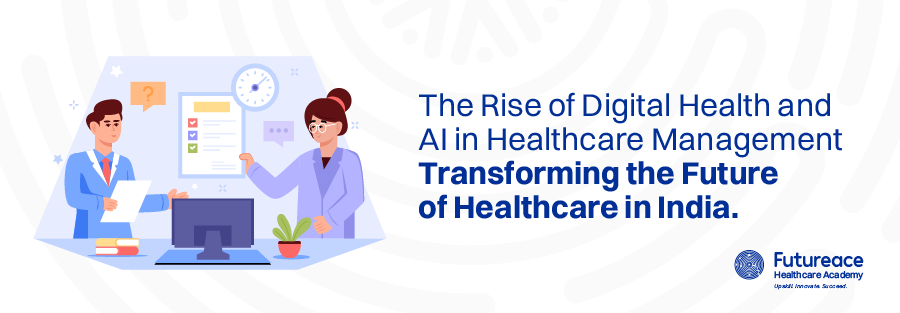In recent years, the integration of digital health and artificial intelligence (AI) has revolutionized the global healthcare landscape. India, with its rapidly evolving healthcare ecosystem, is at the forefront of this transformation. As the demand for quality patient care, operational efficiency, and data-driven decision-making grows, healthcare management professionals must adapt to new-age technological advancements. Digital health and AI are no longer futuristic concepts; they are now integral components of modern healthcare management. This blog explores the profound impact of digital health and AI in the Indian healthcare sector and their implications for the next generation of healthcare leaders.
The Role of Digital Health in Healthcare Management
Digital health encompasses a broad spectrum of technologies that improve healthcare delivery, streamline operations, and enhance patient outcomes. With the advent of telemedicine, electronic health records (EHRs), wearable health devices, and mobile health applications, healthcare administrators are now leveraging technology to bridge accessibility gaps and improve healthcare quality
Telemedicine & Remote Patient Monitoring
The COVID-19 pandemic accelerated the adoption of telemedicine, allowing patients to consult doctors remotely.
Remote patient monitoring devices provide real-time health data, enabling proactive disease management.
Healthcare managers are increasingly incorporating telehealth solutions to optimize hospital resources and enhance patient engagement.
Electronic Health Records (EHRs)
EHRs enable seamless data sharing across healthcare institutions, reducing paperwork and medical errors.
Advanced analytics in EHRs allow healthcare managers to track patient outcomes and improve operational efficiency.
The National Digital Health Mission (NDHM) in India is a significant step toward a unified digital health infrastructure.
Wearable Technology and Mobile Health Apps
Devices like smartwatches, fitness trackers, and glucose monitors provide continuous health monitoring.
Mobile apps facilitate real-time health tracking, appointment scheduling, and medication reminders.
Healthcare administrators are leveraging these tools to promote preventive healthcare and reduce hospital readmissions.
The Role of Artificial Intelligence in Healthcare Management
AI has emerged as a game-changer in healthcare management, enabling data-driven decision-making, predictive analytics, and automation of administrative processes. AI-driven healthcare solutions enhance efficiency, reduce costs, and improve patient care.
Predictive Analytics for Patient Care
AI algorithms analyze vast amounts of patient data to predict disease patterns and recommend personalized treatments.
Predictive analytics help hospitals anticipate patient admission rates, optimize bed occupancy, and allocate resources efficiently.
AI-driven diagnostic tools assist doctors in early disease detection, reducing diagnostic errors.
Automation in Hospital Administration
AI-powered chatbots and virtual assistants streamline patient interactions, appointment scheduling, and billing.
Automated workflows reduce administrative burden, allowing healthcare professionals to focus on patient care.
AI-driven HR management optimizes staff scheduling, ensuring efficient workforce allocation.
AI in Medical Imaging and Diagnostics
AI-powered imaging tools enhance the accuracy of radiology, pathology, and dermatology diagnoses.
Machine learning algorithms detect anomalies in medical scans faster than traditional methods.
AI-assisted diagnostics reduce the workload of radiologists and improve turnaround times
The Future of Healthcare Management in the Digital Age
As digital health and AI continue to reshape healthcare, the role of healthcare management professionals is evolving. Future healthcare leaders must embrace technology, data-driven decision-making, and interdisciplinary collaboration to navigate this dynamic landscape. Key trends that will define the future of healthcare management in India include:
- Integration of AI with Electronic Health Records (EHRs) to create a seamless digital ecosystem.
- Expansion of Telehealth and Virtual Care Models to increase accessibility in rural and underserved areas.
- Use of Blockchain Technology for secure and transparent patient data management.
- Personalized Medicine and AI-Driven Treatment Plans tailored to individual patient needs.
- Cybersecurity Measures in Healthcare IT to protect sensitive patient information.
The rise of digital health and AI in healthcare management presents immense opportunities for improving patient care, optimizing hospital operations, and enhancing overall healthcare efficiency. As India embraces these technological advancements, the next generation of healthcare professionals must be well-equipped with the necessary skills to lead this transformation. By integrating digital health solutions and AI-driven strategies, healthcare management professionals can drive innovation and shape the future of healthcare in India.
The future of healthcare is digital—embrace it, innovate, and lead the way!


